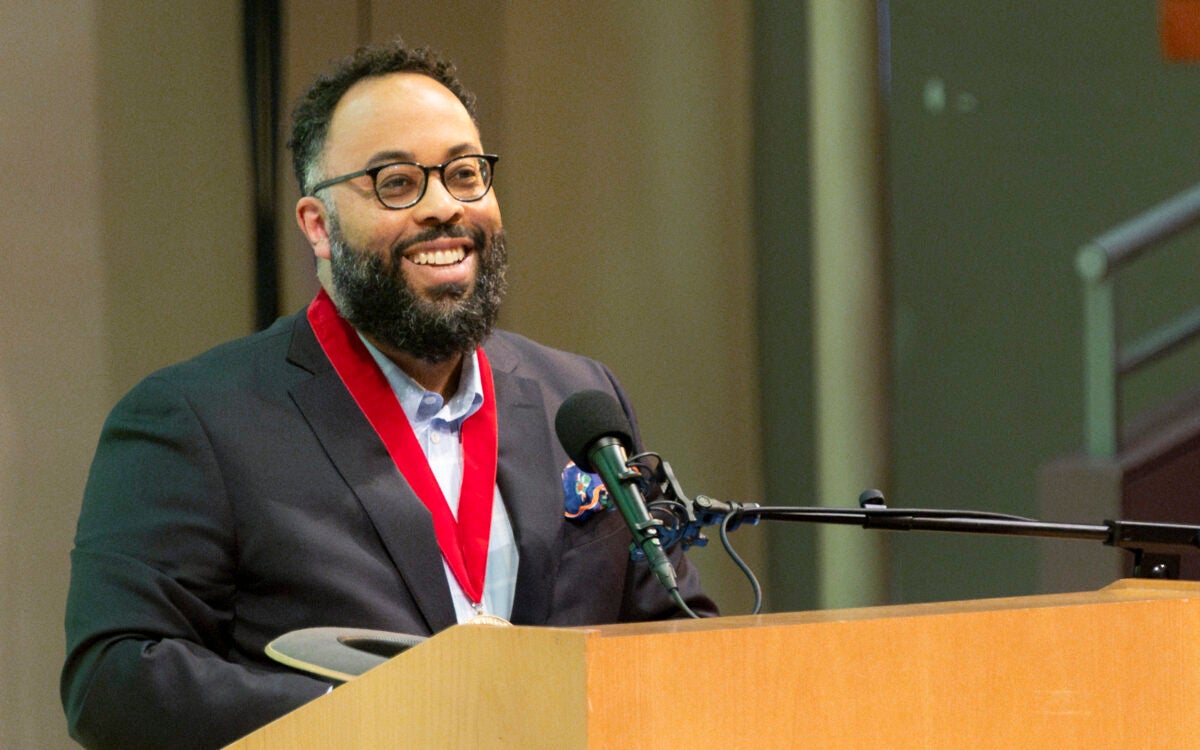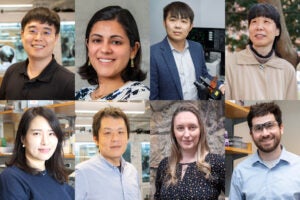Tag: Life Sciences
-
Nation & World
Molecular analysis of T. rex protein shows shared avian ancestry
Putting more meat on the theory that dinosaurs’ closest living relatives are modern-day birds, molecular analysis of a shred of 68 million-year-old Tyrannosaurus rex protein — along with that of 21 modern species — confirms that dinosaurs share common ancestry with chickens, ostriches, and to a lesser extent, alligators.
-
Nation & World
Potent new strategy for mapping animal species shakes up tree of life
Since the 1859 publication of Charles Darwin’s “Origin of Species,” efforts to trace evolutionary relationships among different classes of organisms have largely relied on external morphological observations.
-
Nation & World
Eating meat led to smaller stomachs, bigger brains
Behind glass cases, Harvard’s Peabody Museum of Archaeology displays ancient tools, weapons, clothing, and art — enough to jar you back into the past. But the venerable museum offered a jarring moment of another sort in its Geological Lecture Hall last month (March 20). Paleoanthropologist Leslie Aiello delivered a late-afternoon talk on diet, energy, and…
-
Nation & World
Common aquatic animals show resistance to radiation
Scientists at Harvard University have found that a common class of freshwater invertebrate animals called bdelloid rotifers are extraordinarily resistant to ionizing radiation, surviving and continuing to reproduce after doses of gamma radiation much greater than that tolerated by any other animal species studied to date.
-
Nation & World
Scientists learn what’s ‘up’ with retinal cells
Harvard University researchers have discovered a new type of retinal cell that plays an exclusive and unusual role in mice: detecting upward motion. The cells reflect their function in the physical arrangement of their dendrites, branchlike structures on neuronal cells that form a communicative network with other dendrites and neurons in the brain.
-
Nation & World
Punishment doesn’t earn rewards
Individuals who engage in costly punishment do not benefit from their behavior, according to a new study published this week in the journal Nature by researchers at Harvard University and the Stockholm School of Economics.
-
Nation & World
Protein folding: Life’s vital origami
The way proteins fold, and the good and bad effects of this molecular phenomenon, are what keeps biologist Susan L. Lindquist busy. Lindquist Ph.D. ’76, a Radcliffe Fellow this year, is an award-winning professor and researcher at the Massachusetts Institute of Technology (MIT) and a former director of the Whitehead Institute. She shared her insights…
-
Nation & World
Harvard faculty members discuss state of research
A panel of experts said Tuesday (March 11) that stem cell research’s biggest impact on patients’ health likely won’t come from therapies that inject stem cells or implant tissues made from them, but rather from the knowledge gained by examining diseased tissues grown from the cells.
-
Nation & World
President testifies for increase in NIH funding
With the careers of a generation of young researchers threatened by five years of flat National Institutes of Health (NIH) funding, Harvard President Drew Faust and leaders of six other major research institutions were in Washington Tuesday (March 11) calling on Congress to repair the “Broken Pipeline” through which breakthroughs in the biomedical sciences should…
-
Nation & World
Ecologist Jeremy Jackson to receive Roger Tory Peterson Medal
Jeremy Jackson, renowned marine ecologist of the Scripps Institution of Oceanography, has been selected to receive the 11th annual Roger Tory Peterson Medal presented by the Harvard Museum of Natural History (HMNH). Jackson will deliver the Roger Tory Peterson Memorial Lecture on April 6 at 3 p.m. in the Science Center, 1 Oxford St.
-
Nation & World
Of flies and fish
During her schooldays in 1950s Germany, Christiane Nüsslein-Volhard rarely did her homework. In 1995, she won the Nobel Prize for physiology and medicine. Volhard is now director of the prestigious Max Planck Institute for Developmental Biology in Tübingen, where, decades before, she had been an undistinguished biochemistry undergraduate. She was at Harvard this week (March…
-
Nation & World
Biologist Venter will be visiting scholar at Origins of Life Initiative
J. Craig Venter, the visionary biologist and intellectual entrepreneur who was a leading figure in the decoding of the human genome, will join Harvard University as a visiting scholar at the University’s Origins of Life Initiative.
-
Nation & World
HMS, Broad Institute team works to better understand mitochondria
Why do nearly 1 million people taking cholesterol-lowering statins often experience muscle cramps? Why is it that in the rare case when a diabetic takes medication for intestinal worms, his glucose levels improve? Is there any scientific basis for the purported health effects of green tea?
-
Nation & World
Portion of encyclopedic ‘macroscope’ unveiled
The first 30,000 pages of a massive online Encyclopedia of Life were unveiled last week at the Technology, Entertainment and Design (TED) conference in Monterey, Calif. The project was congratulated by E.O. Wilson, Pellegrino University Professor Emeritus, who articulated the need for a dynamic modern portrait of biodiversity in a widely read essay in 2003.…
-
Nation & World
Research in brief
GROWING U.S. DISPARITIES IN HEALTH NOT INEVITABLE NEW WAY TO GROW BLOOD VESSELS
-
Nation & World
E.J. Corey, Harvard affiliates honored with AAP book award
The Professional and Scholarly Publishing Division of the Association of American Publishers (AAP) recently selected “Molecules and Medicine” — co-authored by Sheldon Emery Professor of Organic Chemistry Emeritus E.J. Corey and postdoctoral fellows in chemistry and chemical biology Barbara Czako and Laszlo Kurti — as the recipient of its 2007 award for best book published…
-
Nation & World
From adult to embryonic stem cell
Harvard Stem Cell Institute (HSCI) and Massachusetts General Hospital (MGH) researchers have taken a major step toward eventually being able to reprogram adult cells to an embryonic stem cell-like state without the use of viruses or cancer-causing genes.
-
Nation & World
Homing in on features of ‘humaniqueness’
Shedding new light on the cognitive rift between humans and animals, a Harvard University scientist has synthesized four key differences in human and animal cognition into a hypothesis on what exactly differentiates human and animal thought.
-
Nation & World
Newsmakers
Three faculty elected to NAE, Linnean Society of London honors Wilson, Arthur Kleinman serves as Cleveringa Professor, Faculty earn Smith Breeden Prize, Pair wins prestigious NSF award, ‘Father of World Wide Web’ to receive Pathfinder Award
-
Nation & World
How brain cells make good connections
Harvard neuroscientist Venkatesh N. Murthy has a sunny second-floor office on Divinity Avenue, where he is a professor in Harvard’s Department of Molecular and Cellular Biology. In one corner is a set of weights and a soccer ball — both untouched in over a year, he said, because of an intensely busy schedule.
-
Nation & World
Chimpanzees have ‘top guns’ on hunts
While hunting among chimpanzees is a group effort, key males known as “impact hunters” are highly influential within the group. They are more likely to initiate a hunt, and hunts rarely occur in their absence, according to a new study. The findings, which appear in the current issue of Animal Behaviour, shed light on how…
-
Nation & World
‘Where do I come from?’
Harvard graduates often return to the University to let their professors know what they’ve been up to since they finished their degree.
-
Nation & World
Bonsai collection highlights age, beauty
The foliage is green and youthful, but the twisted, gnarled trunks show the trees’ age. But that’s the point, of course.
-
Nation & World
Seabed microbe study leads to low-cost power, light for the poor
A Harvard biology professor’s fascination with seafloor microbes has led to the development of a revolutionary, low-cost power system consuming garbage, compost, and other waste that could provide light for the developing world.
-
Nation & World
Newly discovered type of cell death may end up inhibiting tumor growth
Sometimes healthy cells commit suicide. In the 1970s, scientists showed that a type of programmed cell death called apoptosis plays a key role in development, and the 2002 Nobel Prize in physiology or medicine recognized their work. As apoptotic cells degrade, they display standard characteristics, including irregular bulges in the membrane and nuclear fragmentation.
-
Nation & World
Telling the arthropod tale of life
They had sifted through the forest floor’s leaves and dirt for days, looking for a tiny type of daddy longlegs native to New Zealand, but had little more than dirty hands to show for it.
-
Nation & World
Selective attention most impaired during first night shift worked
Our biological propensity for keeping awake during the day and sleeping at night makes night work a challenge. Now, researchers at Brigham and Women’s Hospital (BWH) have found that attention is especially affected during the first night shift. This research appears in the Nov. 28 issue of the Public Library of Science One.
-
Nation & World
Study: Single muscle far more complex than previously believed
New research from Harvard’s Concord Field Station has shown that the common perception of a muscle as a single functional unit is incorrect and that different sections within an individual muscle actually do different work.
-
Nation & World
Fellow’s focus is foggy, froggy forest
In the dark of the Sri Lankan cloud forest, the researchers’ only guide was the headlamps they used to light up the night, illuminating the cold, gray mist that drifted through the trees.
-
Nation & World
Genome study charts genetic landscape of lung cancer
An international team of scientists Sunday (Nov. 4) announced the results of a systematic effort to map the genetic changes underlying lung cancer, the world’s leading cause of cancer deaths.


